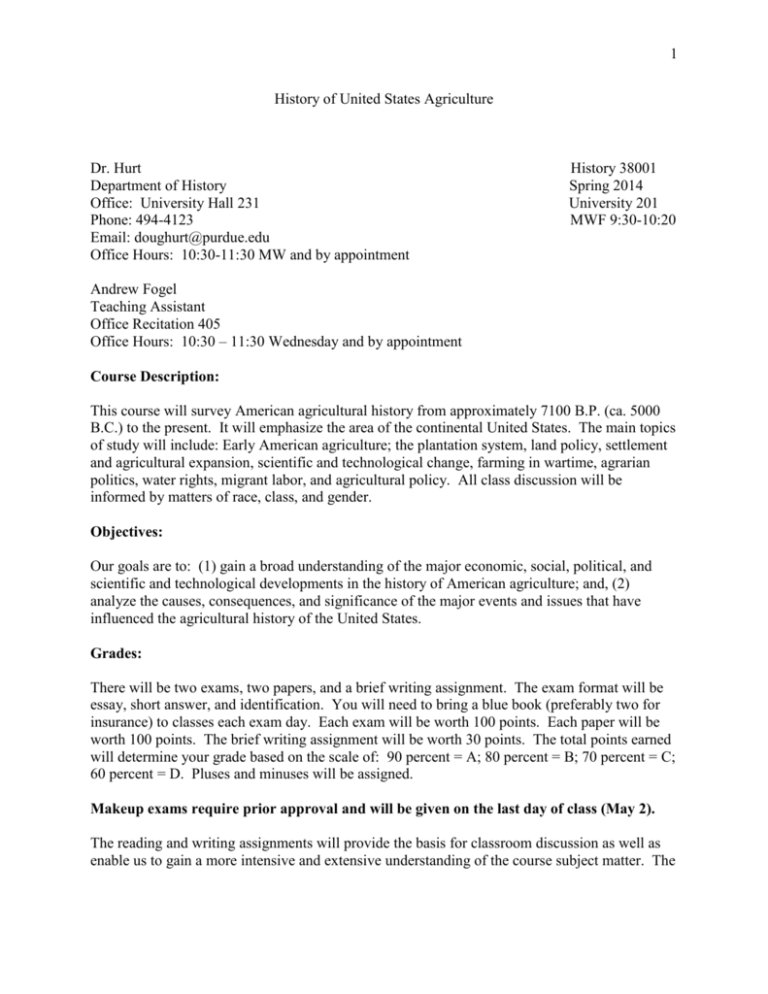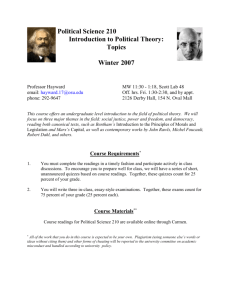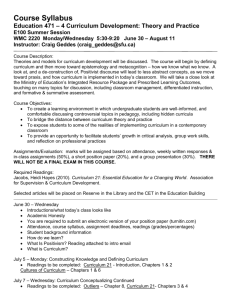Syllabus - Purdue University
advertisement

1 History of United States Agriculture Dr. Hurt Department of History Office: University Hall 231 Phone: 494-4123 Email: doughurt@purdue.edu Office Hours: 10:30-11:30 MW and by appointment History 38001 Spring 2014 University 201 MWF 9:30-10:20 Andrew Fogel Teaching Assistant Office Recitation 405 Office Hours: 10:30 – 11:30 Wednesday and by appointment Course Description: This course will survey American agricultural history from approximately 7100 B.P. (ca. 5000 B.C.) to the present. It will emphasize the area of the continental United States. The main topics of study will include: Early American agriculture; the plantation system, land policy, settlement and agricultural expansion, scientific and technological change, farming in wartime, agrarian politics, water rights, migrant labor, and agricultural policy. All class discussion will be informed by matters of race, class, and gender. Objectives: Our goals are to: (1) gain a broad understanding of the major economic, social, political, and scientific and technological developments in the history of American agriculture; and, (2) analyze the causes, consequences, and significance of the major events and issues that have influenced the agricultural history of the United States. Grades: There will be two exams, two papers, and a brief writing assignment. The exam format will be essay, short answer, and identification. You will need to bring a blue book (preferably two for insurance) to classes each exam day. Each exam will be worth 100 points. Each paper will be worth 100 points. The brief writing assignment will be worth 30 points. The total points earned will determine your grade based on the scale of: 90 percent = A; 80 percent = B; 70 percent = C; 60 percent = D. Pluses and minuses will be assigned. Makeup exams require prior approval and will be given on the last day of class (May 2). The reading and writing assignments will provide the basis for classroom discussion as well as enable us to gain a more intensive and extensive understanding of the course subject matter. The 2 papers are due on or before the assigned date. A letter grade will be deducted for each day the assignment is late. Attendance: Expected Books: The following books are required for the course: Anderson, J. L. Industrializing the Corn Belt: Agriculture, Technology, and Environment, 19451972. DeKalb: Northern Illinois University Press, 2009. Dary, David, ed. A Texas Cowboy's Journal: Up the Trail to Kansas in 1868. Norman: University of Oklahoma Press, 2006. Hagood, Margaret Jarman. Mothers of the South: Portraiture of the White Tenant Farm Woman. Charlottesville: University Press of Virginia, 1996. Paperback Hurt, R. Douglas. American Agriculture: A Brief History, rev. ed. West Lafayette, In.: Purdue University Press, 2002. Paperback Mintz, Sidney W. and George Baca, eds. The Plantation. By Edgar Tristram Thompson. Columbia: University of South Carolina Press, 2010. Paperback Additional Readings: Other readings will be assigned from online sources or distributed in class. Class Topics: Week #1: January 13, Monday: Introduction January 15, Wednesday: Early American Agriculture and Land Policy January 17, Friday: Early American Agriculture Readings: Hurt, pp. 3-40 Week #2: January 20, Monday: Martin Luther King Day, No Class January 22, Wednesday: Tobacco Plantations and Labor January 24, Friday: Rice, Sugar and Labor Readings: Hurt, pp. 40-50, 55-57; Thompson, Chs. 3-4 Week #3: January 27, Monday: The Ranching Frontier January 29, Wednesday: Grain and Middle Colonies January 31, Friday: American Revolution 3 Readings: Hurt, pp. 50-55, 57-70, 78-85; Thompson Chs. 1 and 5 Week #4 February 3, Monday: Cotton Gin and Expansion February 5, Wednesday: Rise of the Corn Belt February 7, Friday: Johnny Appleseed and John Deere Readings: Hurt, pp. 85-114, 137-39; Thompson, Chs. 2 and 6; Bailey, pp. xiii-xlvii Paper Assignment Week #5, February 10, Monday: Civil War February 12, Wednesday: Thompson Paper Due; Discussion February 14, Friday: Open-Range Cattle Industry Readings: Hurt, pp. 117-36, 139-56, 159-64, 173-78; Bailey, pp. 3-45 Week #6 February 17, Monday: Western Settlement and the Railroads February 19, Wednesday: Western Waters February 21, Friday: Post-War South: Sharecropping and Plantations Readings: Hurt, pp. 165-73, 178-89; Bailey, pp. 45-96 Week #7 February 24, Monday: Agrarian Revolt February 26, Wednesday: Agrarian Revolt February 28, Friday: Veterinary Medicine (Professor David Williams) Readings: Hurt, pp. 189-218, 280-86 Week #8 March 3, Monday: Agricultural Science, Hatch Act March 5, Wednesday: Exam #1 March 7, Friday: RFD, Good Roads Movement, Country Schools, and Land-Grant Colleges Week #9: March 10, Monday: Agricultural Extension (Fred Whitford) March 12, Wednesday: Ag. Extension, the Boll Weevil, and the Country Life Movement March 14, Friday: Tobacco and the Black Patch War Readings: Hurt, pp. 221-59; Haygood, pp. 3-59 Week #10 March 17-21: Spring Break 4 Week #11 March 24, Monday: Progressive Era Farm Politics (NPL, Farm Bureau, Farmers Union) March 26, Wednesday: Progressive Era Farm Politics (1920s) March 28, Friday: New Deal Agricultural Policy Readings: Hurt, pp. 260-77, 287-300; Haygood, pp. 63-198 Week #12 March 31, Monday: The Plow That Broke the Plains (Film) April 2, Wednesday: New Deal Agricultural Policy April 4, Friday: Southern Tenant Farmers Union Readings: Hurt, pp. 300-28; Haygood, 199-246; James Agee and Walker Evans, Let Us Now Praise Famous Men, pp. 319-48. Access through Google Books Paper Assignment Week #13 April 7, Monday: Power and the Land (Film) April 9, Wednesday: REA April 11: Friday: Haygood Paper Due; Discussion of Haygood and Agee Readings, Anderson, Chs. 1-2 Week #14 April 14, Monday: World War II and Post-War Agricultural Policy April 16, Wednesday: Harvest of Shame (Film) April 18, Friday: United Farm Workers Movement Readings: Hurt, Ch. 8; Anderson, Chs. 3-4 Discussion Questions Assignment Week #15 April 21, Monday: Migrant Labor April 23, Wednesday: Discussion Questions Due April 25, Friday: NO CLASS Anderson, Chs. 5-8, and Conclusion Week #16 April 28, Monday: Technological Change in the Twentieth Century April 30. Wednesday: Discussion of Industrializing the Corn Belt May 2, Friday: Summary Readings: Hurt, Ch. 9 May 5-9: FINALS WEEK Exam Day and Time to be Determined 5 Plagiarism: Plagiarism means using the words and work of someone else as your own, that is, copying. This applies not only to books, articles and documents, but also to the papers written by classmates. It also means using the words of others, even paraphrased, without attribution. The penalty for plagiarism is failure of the assignment. The penalty for cheating on an exam is failure of the course. Emergencies: In the event of a major campus emergency, course requirements, deadlines, and grading percentages are subject to changes that may be necessitated by a revised semester calendar or other circumstances. In the case of an emergency you can get information about this course through Blackboard, by sending me an email at doughurt@purdue.edu, or by calling me at: 4944123.






